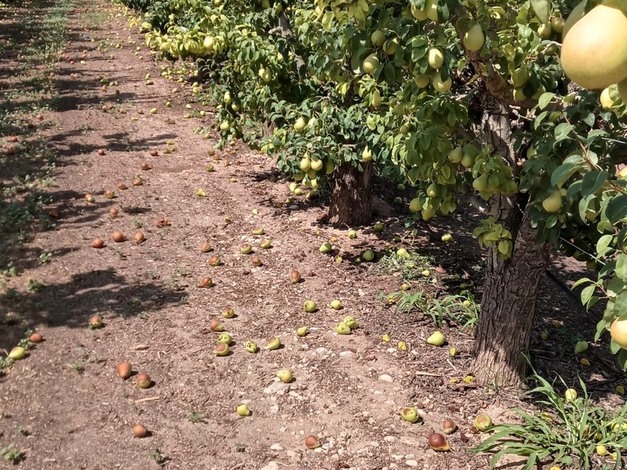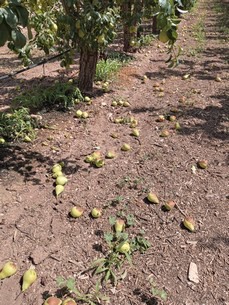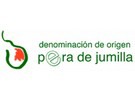Lately, the weather has been showing its most extreme side in Spain. The heavy rainfall recorded last week in the northeast of the Iberian Peninsula was followed by a heat wave that has pushed the temperatures well above 40 degrees Celsius in many parts of Spain, and on Tuesday, the Murcian town of Jumilla recorded what has initially been identified as a thermal blowout.
According to Aemet (Spain's State Meteorological Agency), this tornado-like phenomenon is basically a strong convective downdraft, often originating within a storm cloud, which causes destructive winds lasting for only five to thirty minutes; enough to wreak havoc in the fields of the affected area, says Paco Fernandez, technician of the Jumilla Pear PDO.

"It all happened in a matter of minutes; it was very hot and suddenly it looked like the sky was falling on Jumilla. At first we thought that some areas would have been spared, but the whole region seems to have been affected. New data and information is being provided as the damages are assessed, but it seems pear trees are the most affected, as they are one of the main fruits grown in this area."
"The greatest damages have been reported in the area going from Jumilla to Yecla. We have heard information that in the area of Miraflores, the irrigation community estimates the extent of the damages in some plots at up to 100%, and that in the Cañada del Judío, fortunately, some plots have mostly escaped the effects of the blowout. At the Designation of Origin Jumilla Pears, we estimate that the winds on Tuesday caused between 15 and 20% of the fruit of the plots covered by the PDO to fall to the ground. In terms of volume, this could mean between 400,000 or 500,000 kilos of fallen pears."

"Some plots had already started harvesting about four or five days ago, but most farms had not yet started harvesting, and the wind has caused the fruit that was less sheltered to fall, but also the larger sizes that were soon going to be harvested."
"We cannot forget that the larger sizes weigh more and, for that reason, it is easier for the fruit's woody peduncle to break under its own weight when exposed to strong winds. Still, the extent of the damage has had a lot to do with the orientation and location of the plots, as well as to the size of the trees," says Paco. "In fact, for now we are seeing that trees with a more open bearing are more affected than those in intensive plantations with espalier trees."
"The problem we are seeing with PDO Jumilla Pears is that the first pears, which are usually the ones reaching the largest sizes, are the ones that have fallen. The fruits harvested later are usually smaller, and one of the PDO's requirements is reaching a given size," he says. "The pear's caliber must exceed 55 for the fruit to be allowed to be labeled."
"Only at the end of the month, when we receive the balance sheets from the cooperatives, we will know how the campaign has turned out after this phenomenon."
 For more information:
For more information:
DO Pera de Jumilla
Pl. Alcoholera 3, 2.ª planta, Jumilla, Murcia, Spain
Tel.: +34 968 716 267
info@peradejumilla.es
www.peradejumilla.es
